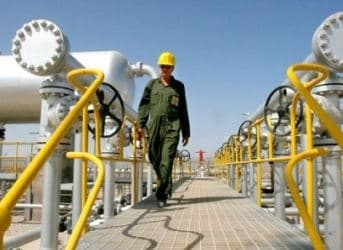China -- one of the few countries to invest in Iran despite international sanctions against it over its nuclear program -- has had its contract to develop Iran’s Azadegan oil field terminated.
On April 29, the National Iranian Oil Co.’s legal department informed state-run China National Petroleum Corporation (CNPC), China's biggest oil and natural gas company, that Iranian Oil Minister Bijan Namdar Zanganeh had issued a decree canceling its contract to develop North Azadegan, citing unacceptable delays.
In February, Zanganeh had voiced his ministry’s dissatisfaction over CNPC’s slow pace in developing Azadegan and gave the company three months to meet its obligations or face expulsion from the project. On March 12, Zanganeh said, "CNPC was supposed to drill 185 wells at the first phase of the field's development plan, but so far only seven wells have been drilled."
The cancellation was preceded by a 90-day warning to CNPC from Iran’s Ministry of Oil, and repeated written and verbal warnings.
Iranian Gas Export Co. manager Rokneddin Javadi said, "The contract stipulates that CNPC had to drill 185 holes in the North Azadegan oil field. However, the company didn’t manage to fulfill its obligations in time; that’s why we have notified it that we are tearing up the contract."
Related Article: Iran Expanding Presence on International Oil Stage
When discovered in 1999, Azadegan (Majnoon), a joint field between Iran and Iraq near the Iraqi border, was Iran's biggest oil discovery in three decades, with 26 billion barrels of proven crude oil reserves in Iran’s sector. But the field’s geologic formation was complex, complicating its development.
China, seeking overseas energy assets to fuel its booming economy, successfully bid for Azadegan, ignoring U.S. sanctions. Japan's Inpex carried out initial exploratory studies but was unwilling to bid on the field, leading Iran to sign the $2.5 billion contract with CNPC, which was to pay 90 percent of Azadegan’s development costs. Iran had earlier invested in the field, but was unable to raise production beyond 25,000 barrels of oil per day (bpd).
CNPC was contracted to bring North Azadegan online in a two-phase development, with ultimate total production estimated at 150,000 bpd. Following the imposition of U.S.-led sanctions during the administration of then President Mahmoud Ahmadinejad, CNPC and other Chinese firms -- including state-owned Sinopec and CNOC -- signed $40 billion worth of oil and gas contracts with Iran.
By 2010, China’s global energy strategy had shifted, however, and Beijing instructed Chinese energy companies to slow or stop work in Iran, because it wanted to strengthen ties to the U.S. energy sector and feared close relations with Iran could put those plans at risk.
Another factor in Beijing’s decision might have been the growing effectiveness of international sanctions on Iran’s energy sector. As the U.S. Energy Information Administration put it, “International sanctions are redefining the Iranian energy sector, and the lack of foreign investment and technology is affecting the sector profoundly… International sanctions enacted in 2011 and 2012 have stymied progress across Iran's energy sector, especially affecting upstream investment in both oil and natural gas projects.”
Related Article: Russia-Iran Oil Swap Deal Gains Momentum
Tough U.S. and EU sanctions have led to several cancellations of Iranian upstream projects and resulted in declining oil production capacity. Sanctions have also impeded Iran’s import of refined products, effectively reshaping the country’s midstream sector and forcing Iran to become self-sufficient.
ADVERTISEMENT
It is unclear what impact Iran’s termination of CNPC’s Azadegan contract will have on future Sino-Iranian bilateral trade. According to the World Bank, China is Iran's largest trading partner and biggest oil importer. In January, the Chinese ambassador to Tehran announced that the value of trade between Iran and China stood at $31 billion in the first 10 months of 2013. In February, Iranian Finance and Economic Affairs Minister Ali Tayyebnia and Chinese Commerce Minister Gao Hucheng signed an agreement finalizing a roadmap to double bilateral trade by 2017.
Recent progress in Western talks with Iran over its nuclear program could result in a qualitative further easing of international sanctions, and raise the likelihood of other foreign energy companies taking an interest in North Azadegen.
By John Daly of Oilprice.com


















